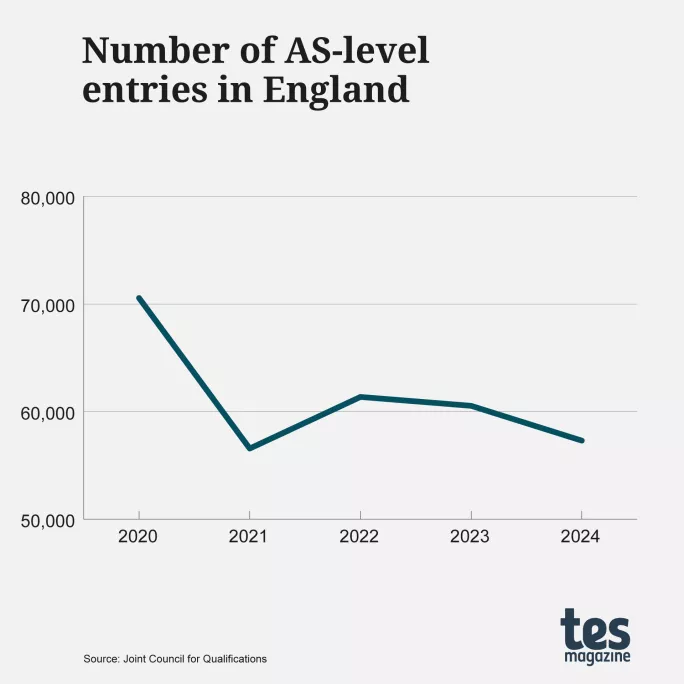
Why do some schools still offer AS levels?

Ever since the decoupling of AS and A levels in 2015, AS levels have been in decline.
In 2015, the final summer before the decoupling, students in England sat 1,286,125 AS levels. In less than a decade, that number has fallen by more than 95 per cent: there were just 57,294 AS entries this summer.
But AS levels haven’t disappeared entirely. In fact, entries actually rose 8.5 per cent between 2021 and 2022, from 56,559 to 61,354.

What’s more, it isn’t just one kind of school offering AS levels: 52 per cent of entries came from non-selective state schools and 38 per cent came from sixth-form colleges, while independent and selective schools offer them too.

So, why are these centres bucking the national trend? Here, sixth-form leaders tell Tes why their schools still offer AS levels.
1. A more accurate assessment check-in
“University is the ultimate goal” for students at Holly Lodge High School College of Science in Smethwick in the West Midlands, says the acting director of sixth form Raj Khera.
As such, the school gets students to take AS levels in a raft of subjects to serve as the “best indicator” of how well they have “grasped the concepts that are taught in Year 12” and therefore “whether or not they will be able to go on and achieve the grades that they need for Year 13 as well”, she says.
This is particularly important for students applying to study medicine, Khera says, because of the competitiveness of the course and the earlier Ucas deadline. “We find that the AS grade carries a lot more weight with universities [compared with predicted grades],” she says.
What’s more, the grades students receive allow the school to see where help is required. For example, for students who get Es and Ds, the school “puts heavy intervention in place” to help them improve the following year, Khera says.
Of course, the school could use internal assessment (which is what it does for other subjects in the humanities or English) but Khera says “robust internal assessment” is much harder for subjects like maths and sciences because students will often have looked at questions from past papers, and creating in-house ones is more time-consuming for teachers.
Therefore, using AS levels is the best way to check progress and help students with their university aspirations. “It’s a no-brainer for us,” Khera says.
2. Finding which subjects work best
At Cabot Learning Federation Post-16 in Bristol, AS levels are offered on a case-by-case basis to give teachers and students the opportunity to have “fruitful conversations about viability [of subjects being chosen]”, says the principal Kath Cooper.
“Some students may pick four A levels [in Year 12] because they’re undecided and they’re passionate about their subjects,” she explains.
“Then they will maybe do an AS in two of them, then they’ll decide, usually based on the better grade, which one they want to carry on [into Year 13].”
Others use the option to take further maths AS, seeing it “as an extension to maths”, and then stop after a year so they can “focus on their maths A level”.
The other benefit of offering AS levels, Cooper says, is that results can be used “as a raised attainment strategy”, so students can see the level they are at and where they need to improve: “If you don’t assess externally for 18 months, there’s a danger of apathy,” she adds.
The most common subject where this can be helpful is maths, she says, because students “find it really hard”, as well as other Stem (science, technology, engineering and maths) subjects, psychology, sociology and religious studies.
Overall, she says, even though less than 10 per cent of CLF Post-16 students sit an AS level, it is useful for those who do: “We have a huge moral compass about having the right students on the right course. AS levels are a good mechanism to benchmark that.”
3. Broadening international opportunities
At the British School of Barcelona, students take four AS levels, to provide more “cushioning” around subject choices. This is especially the case for subjects students might not have taken before, such as economics or psychology, explains the head of secondary and pre-university Mark Woodward.
Starting a new subject is a “gamble”, he says. “But if you start with four, you’ve got that little bit more freedom to then say, ‘actually, these are the three I’m really keen on’.”
Some students choose to stick with four - something Woodward says can help with next steps, as they are often “looking at three different countries for university destinations”, such as Spain, the UK and the Netherlands.
Taking four subjects “gives them the breadth to manage those different applications”, including the fact that while UK universities tend to ask for three A-level grades, AS levels “can be used” elsewhere, such as in Spain, towards an overall point score.
What’s more, getting AS results offers “really good transparency” about where students are doing well and where they need to improve.
Finally, Woodward says the current A-level system, where students only sit exams at the end of two years, is “quite contrary” to what students will encounter at university, so having more regular assessments prepares them for that reality.
- Maths is the most popular A level. But is it fit for purpose?
- 8 key trends in this year’s A-level results
- The ‘perverse incentives’ facing primary MATs
4. Study options and study habits
This desire for subject breadth is the reason why Joseph Chamberlain Sixth Form College in Birmingham offers AS levels. Assistant principal Helen Cordell-Graham says that for some students, it can be “really challenging” to pick just three subjects after doing nine or 10 at GCSE.
So sixth-form students take four subjects in Year 12, which she says is attractive to many applicants.
“A lot of students will pick us because of that breadth of study. When they come to an open day, when they have an interview with us, there’s a lot of discussion about the benefits of doing four subjects.”
Students might take, for example, biology, chemistry, business studies and IT, “hedging their bets on two career paths. Therefore they’re not limiting their options in the future by having to only pick three subjects”.
Typically, the students will continue into Year 13 with three A levels. “But we do have some students every year who continue doing four subjects,” Cordell-Graham says.
She adds that even those who drop their fourth subject benefit from having done an AS level because “the breadth of curriculum stretches and challenges our students” and helps them “develop really good study habits”.
5. Making time for music
Until two years ago, sixth-form students at Bishop Wordsworth’s, a grammar school in Salisbury, completed three A levels, plus a fourth option - either an AS level in further maths or an extended project qualification, or EPQ, which is equivalent to an AS.
But that changed two years ago: “I put to the senior leadership that I would like AS music to be a third option,” Lewis Edney, the school’s head of music, tells Tes. The suggestion was accepted.
Edney explains that part of the rationale for offering AS music was an explicit attempt to encourage more students to take the subject, after numbers had fallen in recent years.
“Music has been massively thwarted by the EBacc,” which was introduced in 2010, Edney says.
In 2009, 9,220 students in England took music A level. By 2023 that had almost halved to 4,929.
“There is a perception that if you want to do law or medicine, there are particular A levels that you need to do,” Edney notes.
So the AS offer is a way of giving students the benefits of music without affecting their other academic choices.
To this point, he says, the subject attracts maths and science students alongside those studying English and philosophy - and complements both kinds of disciplines.
“Music gives a different perspective on problem solving” and encourages students to practise “aural perception”, he adds.
So far, uptake has been modest: in the first year, four students of the 200 in Year 12 took A-level music and two took AS, but one of those “did so well” they continued with the full A level, Edney says.
This year, two students are taking A-level music and two more are doing AS levels. Edney admits that such numbers mean “the strategy of introducing AS music to bulk numbers has not worked yet”, but he says it is still early days.
“And even in those two years, there are four pupils that wouldn’t have chosen to do music if there hadn’t been the AS option,” he adds.
Ellen Peirson-Hagger is senior writer at Tes
For the latest education news and analysis delivered every weekday morning, sign up for the Tes Daily newsletter
You need a Tes subscription to read this article
Subscribe now to read this article and get other subscriber-only content:
- Unlimited access to all Tes magazine content
- Exclusive subscriber-only stories
- Award-winning email newsletters
- Unlimited access to all Tes magazine content
- Exclusive subscriber-only stories
- Award-winning email newsletters
You need a subscription to read this article
Subscribe now to read this article and get other subscriber-only content, including:
- Unlimited access to all Tes magazine content
- Exclusive subscriber-only stories
- Award-winning email newsletters
- Unlimited access to all Tes magazine content
- Exclusive subscriber-only stories
- Award-winning email newsletters
topics in this article



